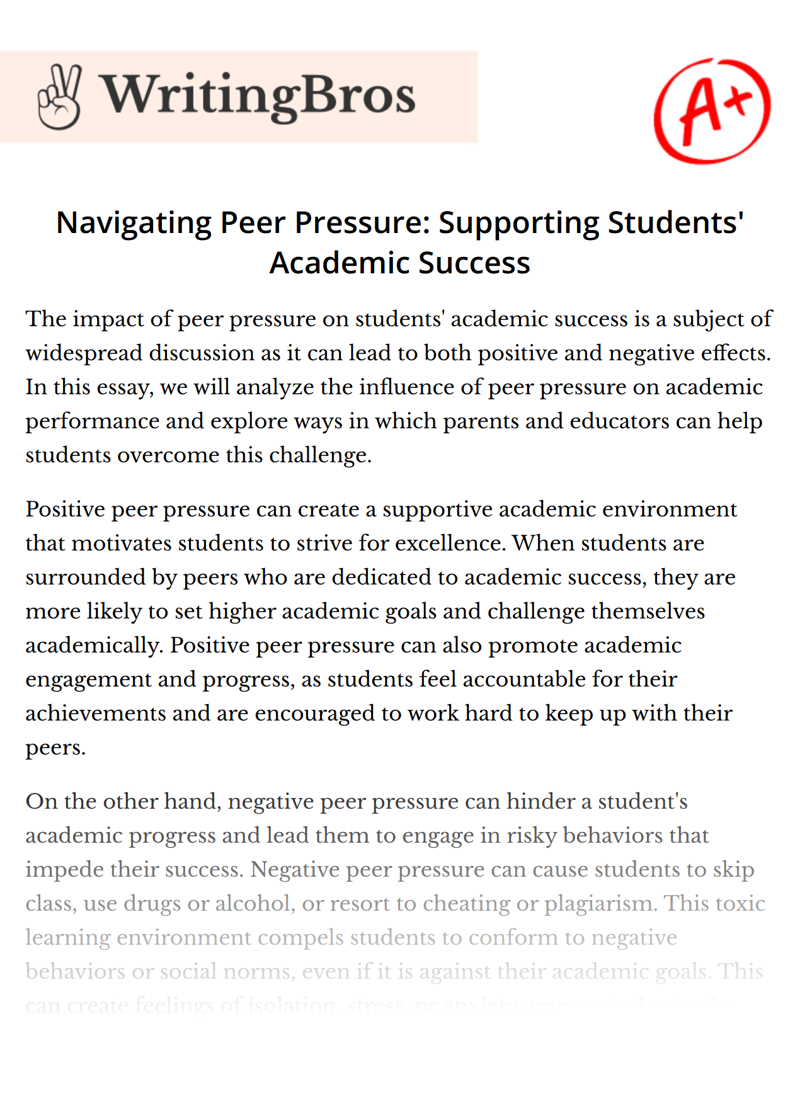Navigating Peer Pressure: Supporting Students' Academic Success

The impact of peer pressure on students' academic success is a subject of widespread discussion as it can lead to both positive and negative effects. In this essay, we will analyze the influence of peer pressure on academic performance and explore ways in which parents and educators can help students overcome this challenge.
Positive peer pressure can create a supportive academic environment that motivates students to strive for excellence. When students are surrounded by peers who are dedicated to academic success, they are more likely to set higher academic goals and challenge themselves academically. Positive peer pressure can also promote academic engagement and progress, as students feel accountable for their achievements and are encouraged to work hard to keep up with their peers.
On the other hand, negative peer pressure can hinder a student's academic progress and lead them to engage in risky behaviors that impede their success. Negative peer pressure can cause students to skip class, use drugs or alcohol, or resort to cheating or plagiarism. This toxic learning environment compels students to conform to negative behaviors or social norms, even if it is against their academic goals. This can create feelings of isolation, stress, or anxiety among students who prioritize social status over academic performance.
To help students navigate peer pressure, parents and educators can provide guidance and support. Teachers can foster positive peer pressure by setting high academic expectations and recognizing students who meet or exceed them. They can also create a classroom culture that values academic achievement and encourages students to support each other's academic progress. For example, teachers can encourage students to collaborate on group projects, form study groups, or engage in collaborative learning to support each other's academic goals.
Parents can provide academic support by assisting their children in setting academic goals, creating a supportive home environment, and promoting positive peer relationships. They can encourage their children to participate in productive activities that reinforce academic progress, such as reading, writing, or completing homework. Parents can also monitor their children's social activities and encourage them to form friendships with students who prioritize academic success. By creating a nurturing home environment, parents can reduce the impact of negative peer pressure on their children's academic performance.
In conclusion, peer pressure can significantly affect students' academic performance, either positively or negatively. Positive peer pressure can motivate students to achieve higher academic goals, while negative peer pressure can distract them and hinder their academic progress. Parents and educators can play a crucial role in helping students navigate peer pressure by understanding its effects and providing positive academic support. By fostering a learning environment that values academic achievement and promotes positive peer relationships, parents and educators can help students achieve their full potential and contribute to their long-term success and well-being.
Cite this Essay
To export a reference to this article please select a referencing style below

